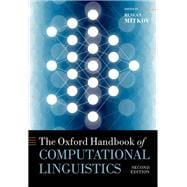Ruslan Mitkov's highly successful Oxford Handbook of Computational Linguistics has been substantially revised and expanded in this second edition. Alongside updated accounts of the topics covered in the first edition, it includes 17 new chapters on subjects such as semantic role-labelling, text-to-speech synthesis, translation technology, opinion mining and sentiment analysis, and the application of Natural Language Processing in educational and biomedical contexts, among many others.
The volume is divided into four parts that examine, respectively: the linguistic fundamentals of computational linguistics; the methods and resources used, such as statistical modelling, machine learning, and corpus annotation; key language processing tasks including text segmentation, anaphora resolution, and speech recognition; and the major applications of Natural Language Processing, from machine translation to author profiling. The book will be an essential reference for researchers and students in computational linguistics and Natural Language Processing, as well as those working in related industries.








